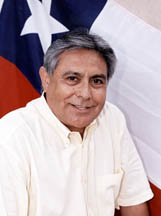Going home
There’s no place like two homes. The Chilean flag and the Texas flag both sport a lone star, and both have been home to Spanish and Latin American Studies Associate Prof. Arturo Flores.
Going home
There’s no place like two homes. The Chilean flag and the Texas flag both sport a lone star, and both have been home to Spanish and Latin American Studies Associate Prof. Arturo Flores.
 Proclamation No. 7 (Warning)
Proclamation No. 7 (Warning)
The Junta of the Military Government hereby advises the population:
1. All persons resisting the new Government should be aware of the consequences…
— Santiago, Sept. 11, 1972
Arturo C. Flores was a 27-year-old doctoral student in Chile that September day when the military ousted the country’s socialist government and placed Gen. Augusto Pinochet Ugarte in power. Within days, reports surfaced of murders, torture and disappearances.
Universities across the country closed; professors, professionals and intellectuals were jailed or murdered. Two of Flores’ classmates were arrested and summarily shot. Hundreds were never found.
Flores, his studies in literature abruptly amputated, couldn’t find work. One evening after the curfew had been extended, Flores and two friends nervously attended a basketball game.
On the way home, they were picked up by a policeman who told them he decided when curfew was and threw them in jail for the night. When Flores arrived home the next morning, his mother was near hysteria with worry. Too many had disappeared permanently.
That was enough. Against his family’s wishes, Flores took a teaching assistantship at Arizona State University in 1975. With limited English skills, he found himself starting over on his graduate studies.
Family drew him back to Chile after his master’s work was finished. Returning was a mistake. The situation there was still intolerable, no work was available, and worse, he and his family had different ideological points of view.
Flores headed back to the States where he earned his PhD at the University of Arizona, then married and taught for a year in Wisconsin before landing at TCU in 1986. Twenty-seven years later, his hair tinged with gray, Flores returned in July to his now-democratic homeland to find out how his generation of exiles fared.
“I want to see how the time of exile changed the perspective of these writers,” Flores said, his English still dyed by his native tongue. “Obviously the time living away from the place you grew up, and going through such a traumatic experience — having seen first-hand the black side of a military government — will have affected their writings.”
During the month-long summer visit, the first of several planned, Flores’ talked with five Chilean authors about being suddenly thrust into a whole new culture, with a different language and customs. Next, he’ll look at how that is reflected in their writing. Flores understands why they write what they write. When he returned in 1988, he took with him carefully preserved memories of Chile. His spirits were dashed when confronted with reality.
“It was a terrible experience for me to realize time had changed so many things, because in my memory nothing had changed,” he said. “You find the people and places that stayed the same in your mind are so different. These writers brought with them the memories of places and streets and faces and have kept them too.” “I want to know how seeing reality changed them.”

Your comments are welcome
1 Comment
The best professor anyone could hope for. What a wonderful story Dr. Flores has to tell.
Related Reading:
Campus News: Alma Matters
From Application to Admission
Amid an increasingly selective admission process, Heath Einstein leads the team that builds the TCU community of the future.
Campus News: Alma Matters
From the Chancellor
Chancellor Victor J. Boschini, Jr., identifies what made TCU and its sesquicentennial so memorable.